Related Research Articles
Feminist science fiction is a subgenre of science fiction focused on such feminist themes as: gender inequality, sexuality, race, economics, reproduction, and environment. Feminist SF is political because of its tendency to critique the dominant culture. Some of the most notable feminist science fiction works have illustrated these themes using utopias to explore a society in which gender differences or gender power imbalances do not exist, or dystopias to explore worlds in which gender inequalities are intensified, thus asserting a need for feminist work to continue.
Science fiction and fantasy serve as important vehicles for feminist thought, particularly as bridges between theory and practice. No other genres so actively invite representations of the ultimate goals of feminism: worlds free of sexism, worlds in which women's contributions are recognized and valued, worlds that explore the diversity of women's desire and sexuality, and worlds that move beyond gender.

Joanna Russ was an American writer, academic and feminist. She is the author of a number of works of science fiction, fantasy and feminist literary criticism such as How to Suppress Women's Writing, as well as a contemporary novel, On Strike Against God, and one children's book, Kittatinny. She is best known for The Female Man, a novel combining utopian fiction and satire, and the story "When It Changed".
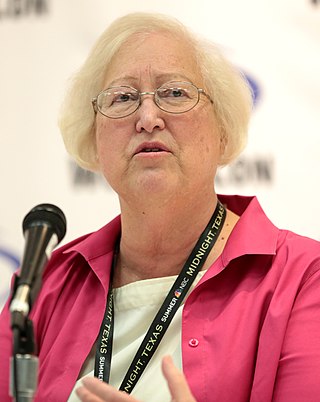
Constance Elaine Trimmer Willis, commonly known as Connie Willis, is an American science fiction and fantasy writer. She has won eleven Hugo Awards and seven Nebula Awards for particular works—more major SF awards than any other writer—most recently the "Best Novel" Hugo and Nebula Awards for Blackout/All Clear (2010). She was inducted by the Science Fiction Hall of Fame in 2009 and the Science Fiction Writers of America named her its 28th SFWA Grand Master in 2011.

Nalo Hopkinson is a Jamaican-born Canadian speculative fiction writer and editor. Her novels – Brown Girl in the Ring (1998), Midnight Robber (2000), The Salt Roads (2003), The New Moon's Arms (2007) – and short stories such as those in her collection Skin Folk (2001) often draw on Caribbean history and language, and its traditions of oral and written storytelling.

Esther Mona Friesner-Stutzman, née Friesner is an American science fiction and fantasy author. She is also a poet and playwright. She is best known for her humorous style of writing, both in the titles and the works themselves. This humor allows her to discuss with broader audiences issues like gender equality and social justice.

Impossible Things is a collection of short stories by American writer Connie Willis, first published in January 1994, that includes tales of ecological disaster, humorous satire, tragedy, and satirical alternate realities. Its genres range from comedy to tragedy to horror. Three of the stories won Nebula Awards, and two won Hugo Awards.
Strange Horizons is an online speculative fiction magazine. It also features speculative poetry and non-fiction in every issue, including reviews, essays, interviews, and roundtables.
The 51st World Science Fiction Convention (Worldcon), also known as ConFrancisco, was held on 2–6 September 1993 at the ANA Hotel, Parc Fifty Five, and Nikko Hotels and the Moscone Convention Center in San Francisco, California, United States.
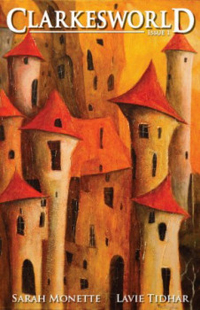
Clarkesworld Magazine is an American online fantasy and science fiction magazine. It released its first issue October 1, 2006, and has maintained a regular monthly schedule since, publishing fiction by authors such as Elizabeth Bear, Kij Johnson, Caitlín R. Kiernan, Sarah Monette, Catherynne M. Valente, Jeff VanderMeer and Peter Watts.
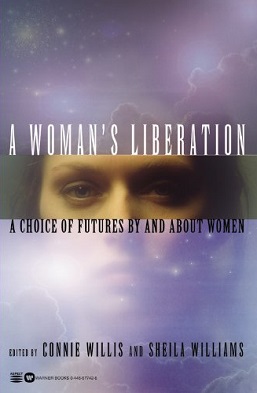
A Woman's Liberation: A Choice of Futures By and About Women is a collection of science fiction stories edited by the author Connie Willis and Sheila Williams. Each story was originally published in Asimov's Science Fiction and/or Analog Science Fiction and Fact magazines.
The role of women in speculative fiction has changed a great deal since the early to mid-20th century. There are several aspects to women's roles, including their participation as authors of speculative fiction and their role in science fiction fandom. Regarding authorship, in 1948, 10–15% of science fiction writers were female. Women's role in speculative fiction has grown since then, and in 1999, women comprised 36% of the Science Fiction and Fantasy Writers of America's professional members. Frankenstein (1818) by Mary Shelley has been called the first science fiction novel, although women wrote utopian novels even before that, with Margaret Cavendish publishing the first in the seventeenth century. Early published fantasy was written by and for any gender. However, speculative fiction, with science fiction in particular, has traditionally been viewed as a male-oriented genre.

Terry Carr's Best Science Fiction of the Year is an anthology of science fiction short stories edited by Terry Carr, the fourteenth volume in a series of sixteen. It was first published in paperback by Tor Books in July 1985, and in hardcover and trade paperback by Gollancz in October of the same year, under the alternate title Best SF of the Year #14.

The 1985 Annual World's Best SF is an anthology of science fiction short stories edited by Donald A. Wollheim and Arthur W. Saha, the fourteenth volume in a series of nineteen. It was first published in paperback by DAW Books in June 1985, followed by a hardcover edition issued in September of the same year by the same publisher as a selection of the Science Fiction Book Club. For the hardcover edition the original cover art by Frank Kelly Freas was replaced by a new cover painting by Richard Powers.

Terry Carr's Best Science Fiction of the Year #15 is an anthology of science fiction short stories edited by Terry Carr, the fifteenth volume in a series of sixteen. It was first published in paperback by Tor Books in August 1986 and in hardcover and paperback by Gollancz in October of the same year, under the alternate title Best SF of the Year #15.
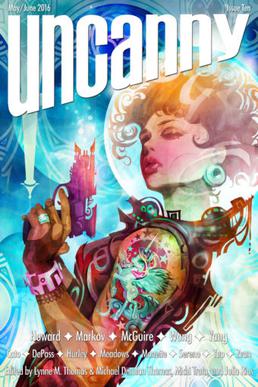
Uncanny Magazine is an American science fiction and fantasy online magazine, edited and published by Lynne M. Thomas and Michael Damian Thomas, based in Urbana, Illinois. Its mascot is a space unicorn.
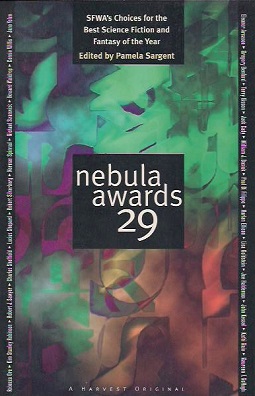
Nebula Awards 29 is an anthology of award-winning science fiction short works edited by Pamela Sargent, the first of three successive volumes under her editorship. It was first published in hardcover and trade paperback by Harcourt Brace in April 1995.

Nebula Awards 28 is an anthology of award winning science fiction short works edited by James Morrow, the third of three successive volumes under his editorship. It was first published in hardcover and trade paperback by Harcourt Brace in April 1994. The book has also been translated into Polish.

Nebula Awards 24 is an anthology of award-winning science fiction short works edited by Michael Bishop, the second of three successive volumes published under his editorship. It was first published in hardcover and trade paperback by Harcourt Brace Jovanovich in April 1990.
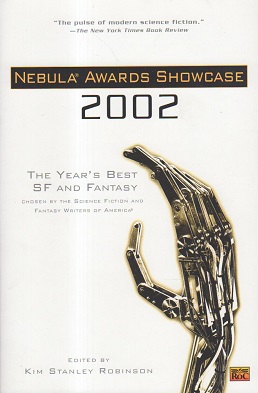
Nebula Awards Showcase 2002 is an anthology of award-winning science fiction short works edited by Kim Stanley Robinson. It was first published in trade paperback by Roc/New American Library in April 2002.
The Science Fiction Awards Database (SFADB) is an index of science fiction, fantasy, and horror awards compiled by Mark R. Kelly and published by the Locus Science Fiction Foundation. Known formerly as the Locus Index to SF Awards, it has been cited as an invaluable science fiction resource, and is often more up-to-date than the awards' own websites.
References
- ↑ 1993 Hugo Awards, at TheHugoAwards.org; retrieved May 17, 2017
- ↑ "sfadb: Nebula Awards 1993". www.sfadb.com. Retrieved 2017-11-17.
- ↑ A Woman's Liberation: A Choice of Futures by and About Women, reviewed by Nalo Hopkinson, in Science Fiction Weekly ; issue 234; retrieved January 13, 2019 via archive.org
- ↑ Reviews: Connie Willis, by Laura Quilter, at Feminist SF; published August 11, 2001; retrieved via archive.org
- ↑ Reviews: Connie Willis, by Laura Quilter, at Feminist SF; published February 18, 2003; retrieved via archive.org
- ↑ Connie Willis Invades Wartime Britain, by Julie Phillips, at the Village Voice ; published October 10, 2010; retrieved May 17, 2017
- ↑ AUDIO BOOKS, edited by Trudi Miller Rosenblum, in Billboard (via Google Books); published December 12, 1996; retrieved May 17, 2017